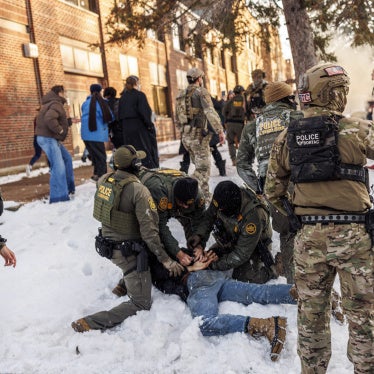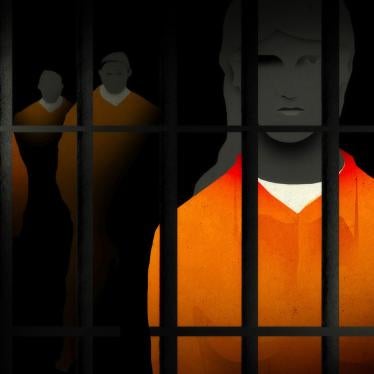In repudiating Bill Clinton´s signature on the treaty to establish an international criminal court, the Bush administration has taken an audacious step. The move suggests that a radically new vision is guiding American foreign policy: that the United States, with its extraordinary power, is no longer served by the international rule of law.
rue, US opposition to the court has not, so far, been couched in these terms. It has tended to focus on the threat that the court might unfairly prosecute an American – even though "unsigning" the court´s treaty only increases that risk. But behind the Bush administration´s decision seems to lie the belief that the US is above international law. A similar resistance to international accountability can be found in its rejection of treaties on climate change, nuclear defence, small arms and biological-weapons inspections.
The "unsigning" of the International Criminal Court (ICC) treaty represents the clearest triumph yet of this unilateralist ideology. Before this view becomes entrenched, a debate is urgently needed about whether it in fact serves America´s interest, let alone the world´s. For, if the current trend continues, the US risks finding itself on the wrong side of history.
A FAIR TRIAL
Tyrants commit genocide and other atrocities when they think they can get away with them. Whereas an ordinary murderer stands a good chance of ending up in prison, the worst that a despot who murders thousands usually has to fear is a comfortable exile in some tropical clime. The ICC attacks this impunity. Since July 1st, when its jurisdiction took effect, anyone who commits genocide, war crimes or crimes against humanity faces a far greater risk of arrest, trial and punishment.
Most democracies embrace the court as a tool to deter and, if necessary, to prosecute tomorrow´s Saddam Husseins and Pol Pots. The Bush administration says that it endorses this goal in principle, but objects to the court because of the remote possibility that an American might unfairly be brought before it.
Admittedly, the US has many enemies who might want to launch an unjustified prosecution. But the court has numerous safeguards against frivolous cases, including extensive due-process rights, narrowly crafted crimes, multiple appeals before independent panels of judges and an emphasis on the worst atrocities. Most important, governments can block the court´s jurisdiction altogether by investigating and, if appropriate, prosecuting their own alleged war criminals – exactly what the US says it already does.
Washington claims these safeguards are inadequate, but its concerns crumble under scrutiny. One canard is that the court´s prosecutor will be "unaccountable" to any political body. In fact, the governments that join the court can remove a prosecutor for misconduct by a majority vote. It is difficult to conceive of more direct accountability. Since joining the court means subjecting one´s citizens to its jurisdiction, most of the ratifying governments are democracies – indeed, close US allies. Of course, the prosecutor will not be accountable solely to the US government, but in the eyes of virtually everyone but the Bush administration, this is not a shortcoming.
Second, the administration claims that it is unfair to subject Americans to the court´s jurisdiction if the US has not ratified the court´s treaty. But the US would not think twice about prosecuting an Egyptian under an anti-terrorism treaty without Cairo´s consent, or a Colombian under an anti-drug-trafficking treaty without Bogota´s. Similarly, if an American commits an ordinary crime abroad, the foreign government has every right to prosecute him, regardless of Washington´s views. So if an American commits an atrocity abroad, the foreign government should also have the right, without US consent, to delegate its prosecutorial powers to the ICC. This is well within the bounds of how the world already works.
Third, some argue that the crimes to be pursued by the court are new-fangled concoctions, offences thought up by academics and non-governmental organisations and foisted on the military. In fact, they can be found in the 1945 Nuremberg charter, the 1948 genocide convention, the 1949 Geneva conventions and the 1977 protocols to those conventions. In each case, the US was intimately involved in drafting the treaty, and has either ratified it or considers relevant parts to be binding customary international law. Some of these rules do reflect a laudatory evolution in international standards since World War II – for example, tougher rules on the indiscriminate bombing of cities – but this has been firmly established for decades.
Fourth, the administration argues that the crimes to be addressed by the court are too vague or malleable. But these are the same crimes that the US government requires its own troops to avoid. They have been defined by international treaties, codified in America´s military codes and applied in criminal courts in the United States and around the world for years. They proscribe not only the use of low-tech arms to commit face-to-face massacres, but also the use of high-tech weaponry to kill civilians deliberately or indiscriminately from great heights or distances.
During negotiations over the court, the only crime that worried the Pentagon was the prohibition of attacks on military targets that cause disproportionate harm to civilians. It feared that this standard was too subjective to be applied by an international tribunal. The Pentagon´s suggested alternative – that to be prosecutable the damage to civilians must be "clearly excessive" in relation to the anticipated military advantage – was adopted word for word.
Of course, even the simplest rule can encounter difficult cases when its application is not self-evident. When criminal prosecution is at stake, the uncertainty of the battlefield usually requires deferring to soldiers´ and commanders´ good-faith efforts to abide by international standards. Certainly, an individual´s freedom should not be sacrificed to 20/20 hindsight or novel interpretations of the law. The ICC´s dependence on its members´ backing for everything from its budget to the arrest of suspects will tend to reaffirm this conservative direction. But deference to good-faith military judgments in close-call cases is quite different from the abdication of review that the Bush administration advocates.
In short, the rules for a fair tribunal are in place. The task now is to ensure that they are conscientiously applied. That will depend on the quality of the judges and prosecutor, as well as on the culture of the court.
Even without ratifying the court´s treaty, the Bush administration could have had a positive influence on such matters by engaging with the court and offering advice on rules, personnel, procedures and prosecutions. Close US cooperation with the international criminal tribunals for Rwanda and the former Yugoslavia has helped to build fair and sober institutions. That was demonstrated, for example, when the prosecutor for the Yugoslav tribunal correctly refused to accuse Nato of war crimes in the politically charged matter of the bombing of Yugoslavia. (Nato had violated international humanitarian law, but these violations did not rise to the level of war crimes, despite exaggerated charges by the Yugoslav government and its supporters.) Rather than promote an academic or "progressive" view of the law, the tribunal rightfully kept its analysis within broadly accepted norms.
With these advantages of engagement in mind, President Clinton signed the court´s treaty in December 2000. By effectively "unsigning" the treaty in May 2002, the Bush administration squandered that influence and gained nothing in return. Unsigning has not delayed the court´s creation or limited its prosecutorial reach. Already, 76 governments have ratified the treaty – well over the 60 needed to launch the court – and many more are near ratification. If a US soldier commits a war crime or atrocity in the territory of a government that has ratified the treaty, the US will still face the choice between conducting its own investigation (and, if necessary, prosecution) and risking the court´s jurisdiction.
Repudiating the court is also likely to impede the US-led anti-terrorism campaign. Washington is asking its allies around the world to cooperate in law-enforcement efforts to track down terrorist suspects. But the administration can only alienate these allies when it opposes a landmark law-enforcement institution for similarly severe crimes. Nor does the administration encourage governments to help it with peacekeeping in Afghanistan when it threatens to destroy peacekeeping elsewhere unless troops are exempted from the ICC´s jurisdiction.
ABOVE THE LAW?
Why, then, did Washington take this costly step? The Bush administration has put forward several justifications, but none holds water. The most common cites America´s unique responsibility for international security. Because of the extraordinary size and sophistication of its military, the US does indeed bear a special security burden. But only the most ardent unilateralist would suggest that this responsibility should give it a licence to commit war crimes. Besides, the United States is hardly the only government with troops deployed in dangerous war zones. American personnel are a tiny fraction of UN peacekeeping troops, yet other contributing governments accept that, especially when acting in the name of global security, adherence to global standards is essential.
Sometimes the administration cites fears about misuse of the crime of "aggression", which, if seven-eighths of its members can agree on a definition of it, the court will be able to prosecute after seven years. Washington claims that this power could be politicised and will infringe on the UN Security Council´s authority to declare an act of aggression. But the court´s treaty requires any definition of aggression to be consistent with the UN Charter, meaning that it must preserve the Security Council´s role. Washington will thus be able to veto any inappropriate allegation of aggression.
Another US objection is stated in humanitarian terms: the Pentagon will be reluctant to come to the aid of people in need if it fears unjustified prosecution. But the Pentagon did not think twice about launching bombing campaigns in Bosnia in 1995 and Yugoslavia in 1999, even though this subjected US soldiers to the risk of prosecution by the international criminal tribunal for the former Yugoslavia. If anything, that tribunal posed greater risks than the ICC: it has primary jurisdiction over any crime it chooses to pursue – that is, it can take a case even if national authorities want to prosecute the matter – whereas the ICC has only secondary jurisdiction, allowing it to address a crime only if national authorities do not.
The only thing that has changed since the Bosnian and Yugoslav bombing campaigns has been the administration in Washington. The Clinton administration was willing to live with the small risk of prosecution because it saw international justice as an essential tool for addressing atrocities such as those of Slobodan Milosevic. The Bush administration, by contrast, has allowed its ideological aversion to international justice to prevail.
Once one peels away the Bush administration´s various excuses and rationalisations for opposing the ICC, a more disturbing explanation is left. The administration apparently believes that, given the United States´ extraordinary power, the rule of law no longer serves the national interest. Usually, the administration speaks only in terms of not wanting foreign judges to second-guess US military actions. But since no modern conception of justice allows for exempting the most powerful, the administration´s view is really an attack on any rule of law in international relations.
The administration correctly observes that Washington can usually get its way on any specific issue through arm-twisting. Why, then, bind the US by international law that might bring about results that are inferior to what Washington could have negotiated on a case-by-case basis? The problem with this reasoning is that no effective global order can rest solely on coercion. Every nation – even a power as dominant as the US is today – benefits from a global order in which most governments abide voluntarily by shared norms, whether of commerce, democracy or peace.
Until the arrival of the Bush administration, Washington seemed to understand the importance of promoting such values as respect for human rights and the rule of law, as well as building US military power. Responsible leadership was given as much priority as power. But the Bush administration, intoxicated by America´s unparalleled might, sees little reason to continue submitting to international standards. Its vision of unbridled American latitude is short-sighted. Rejecting American accountability undermines the rule of law and leaves only a system of coercion. That radical vision does not serve America´s interests, and it certainly does not serve the world´s.








